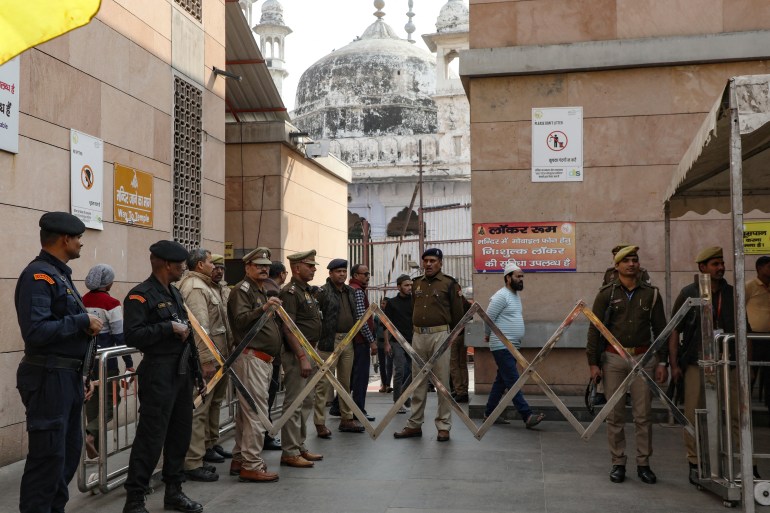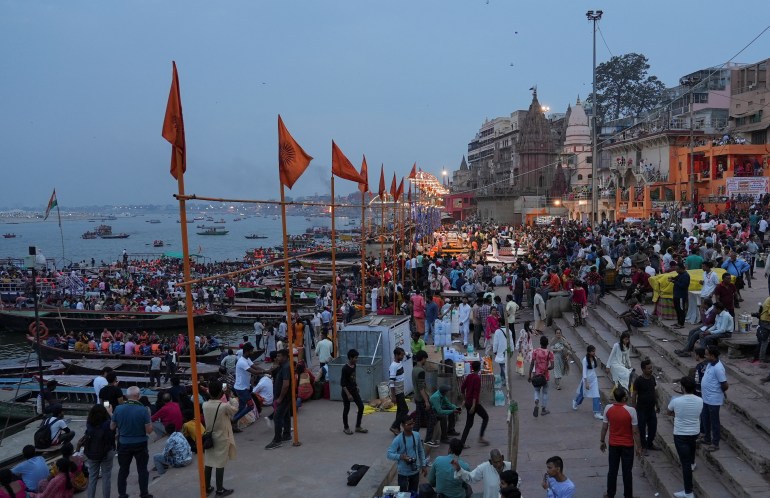Varanasi/Bengaluru, India – A festive environment engulfed Varanasi, one in every of Hinduism’s holiest towns positioned at the banks of the river Ganga.
It used to be the week High Minister Narendra Modi had inaugurated the brand new temple to the Hindu deity Ram the place the Sixteenth century Babri Masjid as soon as stood within the town of Ayodhya, 200km (124 miles) to the north.
In Varanasi, the streets and boats at the river have been decked up with saffron flags bearing illustrations of Ram. Outdoor Varanasi’s well-known and ancient Kashi Vishwanath temple, the odor of burning camphor and the sound of Indian classical tune drifted throughout the air as pilgrims flocked in huge numbers to the temple to supply their prayers.
However subsequent door, in opposition to the west of the temple, the carnival-like spirit used to be changed with a strict and sombre environment, with barricades and law enforcement officials greeting crowds.
The officials have been guarding the Gyanvapi Mosque – which is broadly believed to were constructed at the ruins of a Sixteenth-century Kashi Vishwanath temple demolished by means of Mughal emperor Aurangzeb in 1669.
Whilst the partly ruined Kashi temple has been reconstructed and stands adjoining to the Gyanvapi Mosque, Hindu supremacist teams were seeking to reclaim the mosque for many years.

In Might 2022, some Hindu consumers went to the Varanasi native court docket requesting permission to worship throughout the mosque’s advanced after a court-ordered video survey discovered {that a} ‘Shivling’ – an emblem of the Hindu deity Shiva – used to be discovered close to the wuzukhana, a neatly utilized by Muslim devotees on the mosque.
This situation received momentum in January this 12 months when a survey from the Archaeological Survey of India (ASI), amongst different issues, mentioned that an enormous Hindu temple existed at the website prior to the mosque and that sculptures of Hindu deities have been additionally provide within the cellars of the mosque.
Inside of a couple of days, on January 31, Pass judgement on Ajaya Krishna Vishvesha from Varanasi’s native court docket handed an order ruling that Hindus could be allowed to hope within the mosque’s basement – a piece which were sealed because of safety issues.
“District court docket Varanasi has created historical past as of late,” Vishnu Jain, a Perfect Court docket attorney representing the Hindu facet mentioned in a put up on X.
An afternoon later, movies and photographs started to appear on social media of a clergyman providing prayers to the Hindu deities within the mosque cellar.
#WATCH | A clergyman provides prayers at ‘Vyas Ji ka Tehkhana’ within Gyanvapi mosque in Varanasi, after District court docket order.
Visuals showed by means of Vishnu Shankar Jain, the attorney for the Hindu facet within the Gyanvapi case %.twitter.com/mUB6TMGpET
— ANI (@ANI) February 1, 2024
The Anjuman Intezamia Masajid, the committee managing the Gyanvapi Mosque, rejected the native court docket’s order and is scheduled to problem the case on the Allahabad Prime Court docket within the town of Prayagraj, previously referred to as Allahabad, on February 6.
“It sort of feels just like the judicial gadget is in opposition to Muslims,” Rais Ahmad Ansari, an suggest in Varanasi representing the Muslim facet, informed Al Jazeera.
Even amid a heightened momentum amongst India’s Hindu supremacist motion to focus on mosques, ceaselessly facilitated by means of executive government – a centuries-old mosque used to be razed in New Delhi final week – the case involving the Gyanyavi construction holds deep political importance. Varanasi is the electoral constituency of Modi, who leads the Hindu majoritarian Bharatiya Janata Birthday party (BJP) that regulations the rustic, but has constructed sturdy family members with the presidents and ministers of Western liberal democracies.
India will vote normally elections anticipated to be held between March and Might.
‘You’ll really feel a Hindu vibe throughout you’
Whilst the court docket order hasn’t stirred any violence or communal riots, a way of tension is prevalent within the Muslim neighbourhoods of the town, in line with suggest Ansari.
“Muslim-owned retail outlets closed after the [January 31] listening to fearing a dispute. Friday’s namaz [prayers] used to be additionally greeted with tight safety presence as masses accumulated out of doors the Gynavapi Mosque to supply prayers. There’s a sense of tension in each Muslim’s thoughts,” he mentioned.
“It’s nonetheless non violent in Varanasi. However this peace feels uneasy,” he added.
In the meantime, some information channels within the nation hailed the native court docket order and the onset of prayers within the mosque as “a large win for Hindus” – a sentiment shared by means of a number of Hindus in Varanasi.
“We plan to move discuss with the website and notice the priest acting rituals on the mosque once our tests finish,” Ayush Akash and Harshit Sharma, two 21-year-old political science scholars on the Banaras Hindu College (BHU), informed Al Jazeera.
Nita*, a Hindu devotee on the Kashi Vishwanath temple, used to be additionally willing to hope on the temple.
“We really feel nice about it [court ruling]. If we’re let to discuss with and pray, we will be able to pass. When Hindus pray in Varanasi, they’ve their very own puts of worship. My brother is a clergyman and will simplest worship in his temple. But when the priest lets in us into Gyanvapi, we will be able to without a doubt pass,” she informed Al Jazeera.
“Folks right here were going loopy for the reason that inauguration of the Ayodhya temple,” Nita mentioned.
“You’ll really feel a Hindu vibe throughout you at the streets. It used to be by no means like this prior to, however everyone is excited about issues which might be taking place and that the Gyanvapi is a Hindu temple,” she added.

BHU’s Akash identified that folks from all religions in Varanasi have coexisted peacefully for years and are mature sufficient to not rise up over the temple-mosque dispute.
“It will appear to be Hindus are in energy, and sure, some Muslim other folks could be unsatisfied concerning the native court docket’s resolution at the Gyanvapi Mosque. However on this town, whilst ideologies do fluctuate, it doesn’t prevent Hindu-Muslim friendship. That’s how the true Varanasi is,” he mentioned.
‘All about politics’
Since Modi got here to energy in 2014, critics and rights teams have accused his executive of encouraging or facilitating a upward push in Hindu supremacy, whilst cases of discrimination and violence in opposition to Muslims – who constitute the biggest spiritual minority within the nation – have grown.
Hindu nationalist teams have additionally increasingly more introduced or intensified criminal campaigns in opposition to a number of centuries-old mosques, claiming they’re constructed at the stays of Hindu shrines.
“There’s a slogan which Hindu nationalists were the use of which says ‘Ayodhya Jhaki hain, Kashi-Mathura Baki Hain,’” mentioned BHU’s Akash. Translated, the slogan says ‘Ayodhya is only a preview, Kashi [Varanasi] and Mathura are left’. It’s a connection with how the demolition of the Babri Masjid in 1992 in Ayodhya has been utilized by Hindu majoritarian teams to hunt an identical movements with the Mughal-era mosques in Varanasi and Mathura.
“However at this time, in Varanasi, the Gyanvapi case is all about politics. It sort of feels just like the native court docket gave its ruling in time for the impending common elections. I believe the ruling is to unite Hindus prior to the elections,” he mentioned.
Syed Ali Nadeem Rezavi, secretary of the Indian Historical past Congress and professor of medieval historical past on the Aligarh Muslim College (AMU) shared a an identical view however highlighted that this situation isn’t like Ayodhya.
“No one has ever mentioned that the place the Gyanvapi Mosque stands as of late, there were no temple. It’s transparent there used to be a temple and it used to be demolished. One may even see that with the bare eye,” Rezawi mentioned.
“The explanation in the back of why the temple used to be damaged is the place the rivalry arises for the reason that way by which the historical past of temple demolitions is lately being introduced is a false narrative.”
Rezawi highlighted how the guide, Temple Desecration and Muslim States in Medieval India, written by means of American student Richard Eaton, explains that during pre-colonial India, each dynasty had a deity they prayed to. If the ruler of the dynasty used to be defeated and the dominion used to be taken over, then the deity and the whole thing dedicated to the deity – together with the temple – used to be destroyed by means of the triumphant ruler.
“This used to be an approved apply amongst kings and is precisely what [the emperor] Aurangzeb did. However the reason why in the back of why he demolished the Vishwanath temple and constructed the mosque has many theories with some historians pronouncing it used to be because of spiritual causes and others claiming it used to be Aurangzeb’s approach of punishing the Hindu circle of relatives who controlled the mosque since they’d helped the Hindu king Shivaji break out,” he added.
“What Aurangzeb did will have to be condemned. However he lived all through an period when there used to be no charter. We now have an Indian charter which promises positive rights to other folks. So I don’t perceive why the courts and top minister are ignoring this and committing a criminal offense extra heinous than Aurangzeb,” Rezwai mentioned.
Constitutionally, India is a mundane state. The rustic additionally handed a legislation in 1991 known as the Puts of Worship Act, which prohibits the conversion of puts of worship and stresses that their spiritual nature will have to be maintained.
However the ultimate say about the way forward for the mosque lies with the rustic’s courts.
Abhishek Sharma, a Kashi temple devotee and coordinator on the Swagatam Kashi Basis, informed Al Jazeera that “other folks in Varanasi consider in ‘Ganga-Jamuna tehzeeb’,” a metaphor for social unity that references the mingling of the waters of the Ganga and Yamuna rivers.
“We now have at all times believed in residing in combination in sanctity. We pray that this peace isn’t be disturbed in any respect,” he mentioned.
*Some names were modified to offer protection to identities.

